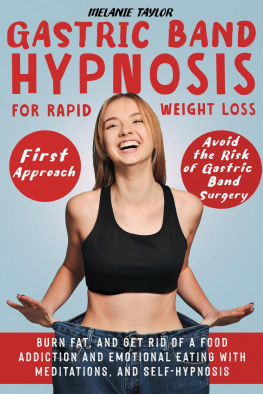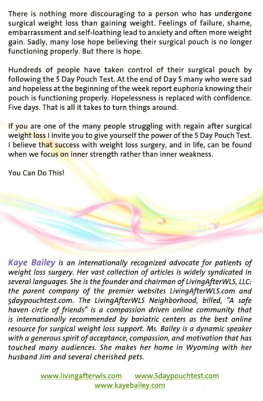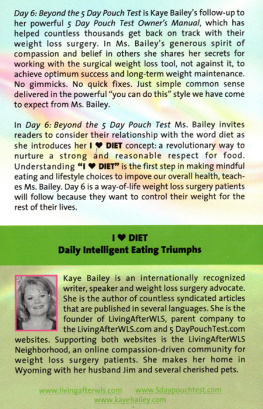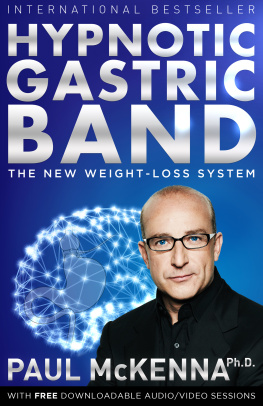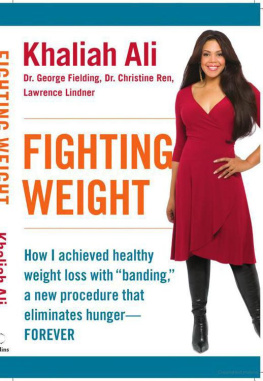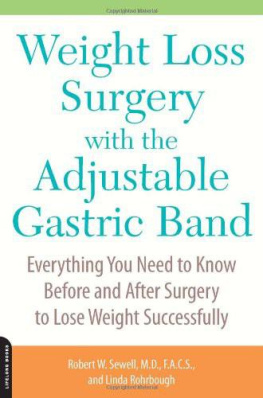Avoid the Risk of Gastric Band Surgery, Eliminate Trigger Foods and Emotional Eating With Powerful Affirmations, Mindful Eating and Self-Hypnosis.
Copyright 2021 by Jessie Slee- All rights reserved .
This document is geared towards providing exact and reliable information in regard to the topic and issue covered.
- From a Declaration of Principles which was accepted and approved equally by a Committee of the American Bar Association and a Committee of Publishers and Associations.
In no way is it legal to reproduce, duplicate, or transmit any part of this document in either electronic means or in printed format. All rights reserved.
The information provided herein is stated to be truthful and consistent, in that any liability, in terms of inattention or otherwise, by any usage or abuse of any policies, processes, or directions contained within is the solitary and utter responsibility of the recipient reader. Under no circumstances will any legal responsibility or blame be held against the publisher for any reparation, damages, or monetary loss due to the information herein, either directly or indirectly.
Respective authors own all copyrights not held by the publisher.
The information herein is offered for informational purposes solely and is universal as so. The presentation of the information is without contract or any type of guarantee assurance.
The trademarks that are used are without any consent, and the publication of the trademark is without permission or backing by the trademark owner. All trademarks and brands within this book are for clarifying purposes only and are owned by the owners themselves, not affiliated with this document.
Introduction
We all know that the human brain and our physical bodies are two important parts of who we are. Unfortunately, too many people focus solely on one side of this coin while ignoring the other. The brain is a critical component of weight loss: it controls how many calories you eat and tells your body when to stop eating so you dont overeat. But its also important to acknowledge the role that food plays in brain function. Food fuels brain activity, and the nutrients within help the brain grow.
What happens if you starve your brain of the food it needs to operate efficiently and properly? In particular, what happens to your brain when you are dieting? Will a calorie-restricted diet prevent weight loss by causing your brain to malfunction? While there is far more research to be done on this topic, we do know that drastic calorie restriction can lead to a drop in blood flow and oxygen reaching the brain.
No one expects the human body (and particularly its diverse tissues) to function optimally with starvation. The need for food and oxygen might be secondary if you cut out calories, but the fact is that weight loss does affect both the brain and the body, and it disrupts the metabolism of many other bodily systems.
The mind's role in weight loss: "You can't be all things to all people."
Indeed, you cant please all people all of the time and there are some people whose preference for certain foods or eating habits can make it impossible for them to lose weight. But many people can lose weight by using certain strategies.
For example, some people like to exercise regularly but they dont have to become nutritionist gurus to do it. A lot of that depends on what kind of exercise youre doing, how much and how often you do it, and how much rest you get between.
Some people crave salt, sugar, fat, or anything else that makes them feel full. These people cant just give up those foods and do better next time. They have to learn how to control their cravings.
And some people know a lot about nutrition, but no matter what they do, they simply cant lose weight. Thats because they have a genetic problem that makes it nearly impossible for them to reach their ideal body weight.
But what about people who crave food and don't know why? There are many reasons why people crave certain foods. For example, they like to eat salty stuff because they associate salt with comfort or happiness. Perhaps they remember being in tears as a child, and now they're hungry to relive the emotion of those days...
The mind is a powerful tool. If you lose weight, you will start to see changes in your health and body. This can be used with gastric band surgery (gastric bypass). You must learn the food habits that are required for success. It takes commitment and dedication on behalf of the patient and doctor alike. The patients after the gastric band surgery are taught the proper foods and meals to lose weight.
Chapter 1: Psychology and Food
Take a second to think about that.
But it's not just the simple connection of what you put in your mouth that is contributing to your physical well-being. It's more than that. And it goes deeper than just calories or weight loss or the latest fad diet.
The connection between psychology and food is an intricate one that explores the psychology of our eating habits. We eat for a purpose. An actual reason. And while many are fooled to think that they're eating because of physical hunger, in many ways, we're actually eating for psychological reasons.
So what are some of these psychological reasons that we eat?
The most common answer is the psychology of food. The psychology of food, if you ask psychologists, is a big part of why we eat. Food has a psychological effect on people. It can evoke emotions in us and cause us to take steps that we may not have otherwise been inclined to take, like eating out or shopping for food at the mall, or driving into work during lunchtime.
Psychologists are fascinated by food. They study the connection between food and the human psyche.
The truth is that food feeds us. We eat, we nourish ourselves. Food can be magical in many ways. Dr. David Kessler has said, "Food is probably the most important motivator in getting people to do something."
All of these things, plus a precise amount of calories, all combined together in our bodies help to sustain us.
The psychology of food is fascinating. It's all about the way that we acquire, store and use food.
Let's say you're a professional golfer. You need to hit the links as much as possible because that's where you get your competitive edge, right? Of course, you do. Golf is one of those sports that depend on fitness, nutrition, and mental focus. And it seems clear that your performance on the golf course does depend a great deal on both physical and mental factors.
So, if you're a professional golfer, then what do you do to try to get your edge on the golf course?
Well, you probably go to the gym as often as possible and spend a lot of time on diets and other weight loss programs. You might consider taking supplements or other substances that will help you lose weight. You may even try some artificial sweeteners that will help curb your appetite and help you lose weight faster than simply dieting.
But the psychology of food does not end there. It's not just about diet and exercise. The psychology of food also touches on how you think about food, how much you eat, and what kind of things you eat.
If a psychologist were to ask you what drives youre eating habits, what would you say? How would you frame your answer? Most likely, it's not because your body needs sustenance. We've already been over that (food provides us with nourishment).
But in the end, what we come to find out is that the purpose of food isn't simply physical nourishment. In fact, many studies have shown that food provides a sense of comfort and ease for some people. They enjoy preparing the food or eating the food or talking about food because it gives them a sense of pleasure and relief. But in turn, they also end up gaining weight because when you're eating for pleasure and not for physical hunger, then you're more apt to overconsume.



